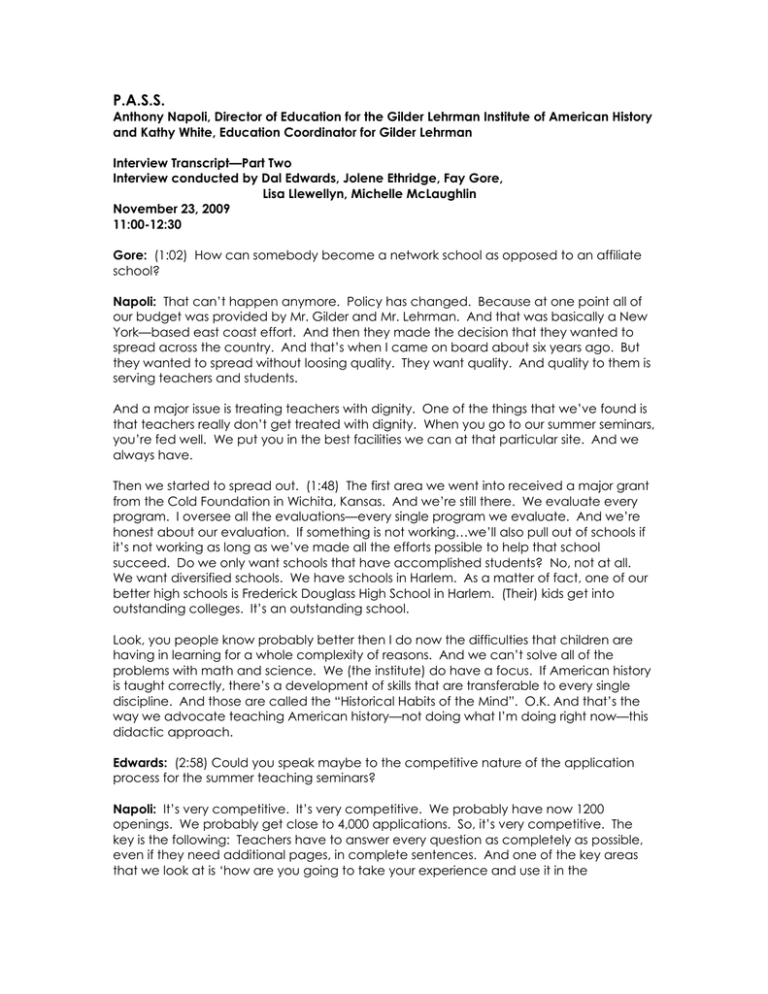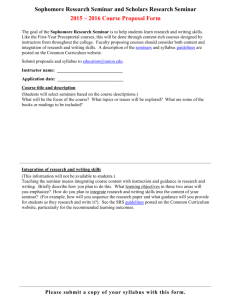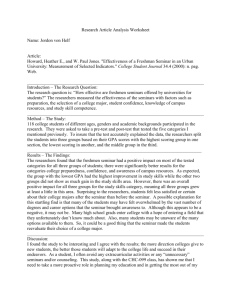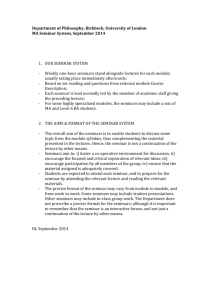P.A.S.S.
advertisement

P.A.S.S. Anthony Napoli, Director of Education for the Gilder Lehrman Institute of American History and Kathy White, Education Coordinator for Gilder Lehrman Interview Transcript—Part Two Interview conducted by Dal Edwards, Jolene Ethridge, Fay Gore, Lisa Llewellyn, Michelle McLaughlin November 23, 2009 11:00-12:30 Gore: (1:02) How can somebody become a network school as opposed to an affiliate school? Napoli: That can’t happen anymore. Policy has changed. Because at one point all of our budget was provided by Mr. Gilder and Mr. Lehrman. And that was basically a New York—based east coast effort. And then they made the decision that they wanted to spread across the country. And that’s when I came on board about six years ago. But they wanted to spread without loosing quality. They want quality. And quality to them is serving teachers and students. And a major issue is treating teachers with dignity. One of the things that we’ve found is that teachers really don’t get treated with dignity. When you go to our summer seminars, you’re fed well. We put you in the best facilities we can at that particular site. And we always have. Then we started to spread out. (1:48) The first area we went into received a major grant from the Cold Foundation in Wichita, Kansas. And we’re still there. We evaluate every program. I oversee all the evaluations—every single program we evaluate. And we’re honest about our evaluation. If something is not working…we’ll also pull out of schools if it’s not working as long as we’ve made all the efforts possible to help that school succeed. Do we only want schools that have accomplished students? No, not at all. We want diversified schools. We have schools in Harlem. As a matter of fact, one of our better high schools is Frederick Douglass High School in Harlem. (Their) kids get into outstanding colleges. It’s an outstanding school. Look, you people know probably better then I do now the difficulties that children are having in learning for a whole complexity of reasons. And we can’t solve all of the problems with math and science. We (the institute) do have a focus. If American history is taught correctly, there’s a development of skills that are transferable to every single discipline. And those are called the “Historical Habits of the Mind”. O.K. And that’s the way we advocate teaching American history—not doing what I’m doing right now—this didactic approach. Edwards: (2:58) Could you speak maybe to the competitive nature of the application process for the summer teaching seminars? Napoli: It’s very competitive. It’s very competitive. We probably have now 1200 openings. We probably get close to 4,000 applications. So, it’s very competitive. The key is the following: Teachers have to answer every question as completely as possible, even if they need additional pages, in complete sentences. And one of the key areas that we look at is ‘how are you going to take your experience and use it in the classroom?’ In other words, if you’re taking, or signed up for something on Jefferson, ‘how do you envision teaching Jefferson differently?’… So the books that they (teachers) receive tend to be scholarly books. And we also found that if we gave two or three books, teachers probably wouldn’t have read them— probably because of their busy schedule. I’m not being critical. So in many cases, it’s now one book. White: North Carolina is hosting its first summer seminar… Edwards: I saw that…is that on women’s history? Napoli: Yes. That’s with Lisa Levenstein. I was with her last week up in Boston. We did a seminar together. That’s going to be on women’s history. She’s at the University of North Carolina at Greensboro. So she’ll be doing a seminar… White: ...at Duke. Napoli: That’s right…that will be the first one (in North Carolina). Edwards: You’ve expressed some topics, but could you give us maybe the more popular summer seminar topics? Napoli: (4:18) New York in the Gilded Age (Kenneth Jackson, Columbia)…the Underground Railroad at Yale with Jim Horton, very popular…David Kennedy out at Stanford on the Great Depression…Alan Brinkley at Columbia on the Period between the Wars (World War I and II)…Eric Foner on Reconstruction…Gordon Wood on George Washington, but truly the colonial period…(Richard) Carwardine at Oxford University on Lincoln…Tony Badger at Cambridge University on Civil Liberties…Arne Westad at Cambridge University on the Cold War…We have one on Jefferson down at the University of Virginia. We also have one on the Civil War by Gary Gallagher at the University of Virginia. Another very popular one is (on the Battle of) Gettysburg at Gettysburg College…Ed Ayers at the University of Richmond (on the South in American History)…We also have one now on the 1960s (at Georgetown University with Michael Kazin and Michael Flamm). A very popular one is on the Great Plains at the University of Colorado at Boulder with Elliott West…very, very interesting. He ends the course in 1607, because many kids think that when the English came over, there was nobody here. There was a very rich culture. So he ends the course in 1607. (5:23) Many of our summer seminars include visits to historical sites and museums. So, on the Great Plains, which I did with him I guess for three or four summers, we would take the group on the Great Plains to Old Bent’s Fort. You have the first priority (when applying to a summer seminar). If you don’t get that it’s the second priority, the third priority. You cannot go two years in a row because we want to spread the number of people going. We get them from Europe. We do get them from Alaska and Hawaii. And if they’re affiliate schools, or network schools, their teachers get priority—not ‘definites’—but priority. In other words, their applications are brought out because we want to support the teachers from those schools who have somehow indicated an interest in the study and teaching of American history. (6:04) One of the indications of our success is the number of teachers who want to continuously go to our summer seminars, our teaching seminars, etc. Not everything you get at these seminars has direct application to the classroom. Even if you’re a high school teacher and you go to New York on the Gilded Age, you’re not going to be able to incorporate all of that in your high school classroom. But the building up of your background and the mastery of your subject matter will make you more creative pedagogically. There’s no question about it. The more comfortable you are with your subject…we all remember our first year teaching. My first year was on European History. I said ‘I have to cover from ancient times to present times in ten months?’ You remember? All right. And you were always like one chapter ahead. You were very aligned on textbooks. And by the way, we don’t advocate textbooks because of its limitations. So, we supply primary sources. (6:54) Now, if any of these affiliate schools were to write to me or to write to Kathy and say ‘can we have a group or primary sources on the Cold War?’ We would send them a booklet of primary sources on the Cold War. We have wonderful materials. We also have a very popular summer seminar on digital history (Steven Mintz at Rice University)…on how to develop digital history. And some of the best products came out of our second grade students. You have to see what these kids created. I still use slate. These kids are so far advanced in technology… (Music)





